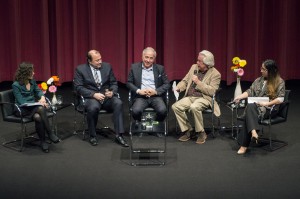Three panelists who aim to help solve the Syrian refugee crisis debated the situation and analyzed its causes and action plans Tuesday night at the Hammer Museum in Westwood.
About 180 residents, alumni and students attended a forum that featured Jana Mason, senior adviser for the United Nations High Commissioner for Refugees, Dr. Orfan Chalabi, president of the California chapter of the Syrian American Medical Society, and Dr. Max Sawaf, a Syrian-American doctor.
A U.N. envoy invited several Syrian politicians and warlords Tuesday to engage in peace talks that aim to solve the Syrian refugee crisis.
Claudia Bestor, director of public programs for the Hammer Museum, said the Syrian refugee who intended to speak at the event cancelled his appearance after reprisal from the regime of Bashar Hafez al-Assad.
Ian Masters, a local radio host, organized the event as a part of the Hammer Forum series.
Mason said Syrian refugees are the largest group of displaced people, out of 60 million in the world, according to U.N. statistics. She added Turkey and Lebanon have accepted the largest number of refugees, followed by Jordan, Iraq and Egypt.
Mason said she has been working on refugees and migration issues as a liaison to the government for several years, but this is the first refugee crisis constantly discussed on mainstream media, cable and radio.

(Rocio Flores Huaringa/Daily Bruin)
Sawaf, who earned his medical degree in Syria, said he thinks the root cause of the crisis is Syrian government officials, who have instilled a fear using torture.
“In Syria, people only open their mouth at the dentist’s,” Sawaf said.
Sawaf, an economic refugee himself, added he thinks no refugee wants to return to Syria.
“Syrians are like Americans, they want better future for their children,” he said. “So no one wants to go back.”
Sawaf, who helped select negotiators for the U.N. peace talks, said he thinks the only solution to ensuring a safe future for Syrians is to get rid of the Assad regime.
He added authorities told Syrians they will have to let Assad run for an election again if they want a solution to the crisis. He said officials promised Syrians a fair election if Assad runs again.
Chalabi said about 60 percent of medical aid and volunteer work comes from the United States.
“We need to provide more help,” he said. “Our universities, can help by providing e-courses, education and information to the refugees.”
Grace Nasvu, a fourth-year communication studies student who attended the event, said she has studied the Syrian refugee crisis but wanted to learn more from a different perspective.
“I wanted to listen to people who have directly been involved in the problem,” Nasvu said.
Sakina Ayaz, a third-year statistics student who also attended the event, said she came to listen to a refugee’s first-hand account.
“I think it’s important to hear other people’s opinions,” she said.
At the event, members of the audience asked the panelists about how they can help.
Mason said she thinks people can spread facts about the crisis, donate to refugee agencies and volunteer to help local resettlers.
The Hammer Museum’s next monthly forum, titled Greening the Gas Tank, will feature panelists who discuss non-polluting vehicles. The forum on Feb. 2 is open to the public.
Contributing reports by Evolet Chiu, Bruin contributor.

Was there anyone there who spoke against admitting the refugees on the grounds that they cannot be properly vetted and ISIS is embedding their own people among them-in addition to the mess going on in Europe?
God forbid that a university would present two sides to an argument.
Just asking.